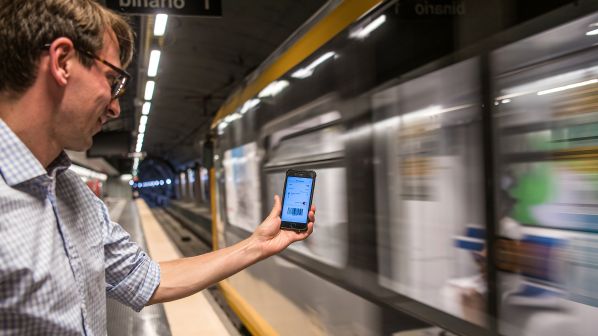HITACHI Rail has begun a six-month pilot in the Italian city of Genoa to test its 360Pass smart ticketing app, which provides hands-free ticketing by means of Bluetooth sensors installed across the urban transport network.
The 360Pass launch trial started on May 9 on the network of municipal operator AMT, which includes a metro line running for 6.5km from Brin to Brignole serving eight stations, carrying 15 million passengers a year.
AMT also operates two funicular railways, a rack railway and 10 public lifts, as well as a fleet of 663 buses that carry around 50% of all public transport traffic in Genoa.
The 360Pass is being tested under the local brand name GoGoGe in partnership with AMT and the municipality of Genoa, forming part of its drive to increase public transport use.
The 360Pass provides “hands free” ticketing, as users do not have to take their mobile phone out of their pocket when undertaking a journey on public transport.
By connecting with the 7000 Bluetooth sensors that have been installed across the AMT network, the 360Pass is able to track journeys and calculate the best fare to be paid by the passenger.
The daily fare is currently capped at three times the cost of a single journey, and AMT says that weekly and monthly fare caps are under development.
The 360Pass app offers personalised information about public transport journeys, including the fastest and most convenient multi-modal route options and real-time journey updates. Passengers can also check how busy services are, enabling them to avoid overcrowding.
“The hands-free technology is a game-changer,” says AMT CEO, Mr Marco Beltrami. “The GoGoGe app is a one-stop shop for all services, and it is really easy for the passengers to use. It offers a unique travel experience.”
360Pass forms part of Hitachi’s Lumada intelligent mobility management suite, launched on July 20.
Lumada includes the 360Motion platform that provides real-time analytics enabling public transport operators to track, model and manage journeys across multiple modes.
It also provides a “digital twin” of passengers’ end-to-end journeys, allowing operators to improve timetables and the allocation of vehicles.
“We can develop very deep knowledge of origins and destinations, and we can dynamically adapt the service thanks to real-time information on congestion,” Beltrami says.
In addition, the 360Pass technology offers significant cost savings over legacy ticketing systems, according to Mr Alessandro de Grazia, group head of smart ticketing at Hitachi Rail.
“We supply software as a service and the hardware can be installed in three or four weeks,” de Grazia says. “Installation and maintenance costs are a game-changer compared with traditional ticketing systems.”

